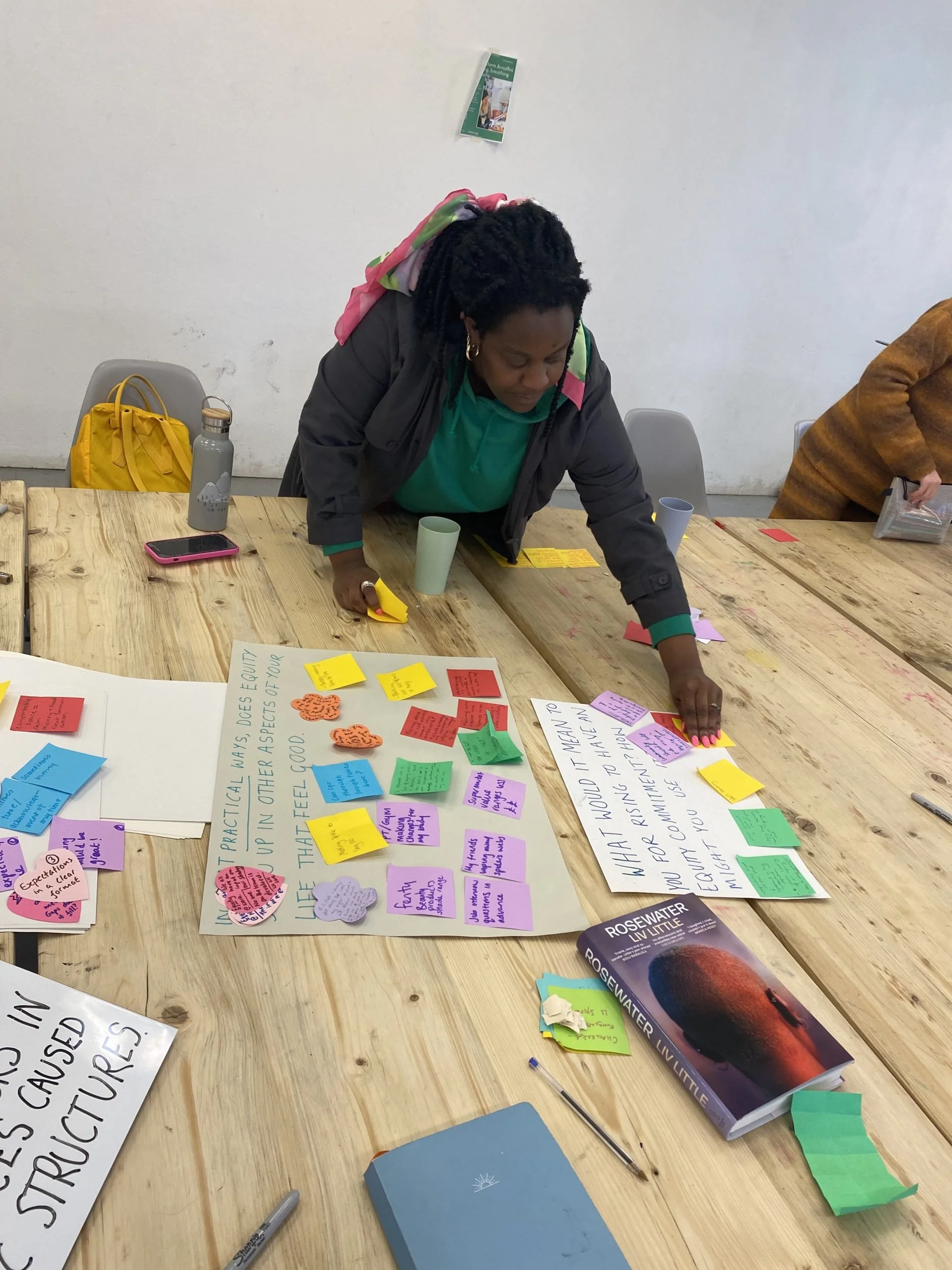What does an equitable ending look like?
We’ve been thinking about equity and continuing legacy.
Often, if you ask an organisation to share how equity shows up in their workplace they’ll point you to an equality, diversity and inclusion policy and let you know how often it’s updated and reviewed. While this has it’s place, meaningful conversations about equity rarely happen in workplaces or in the sector at large. That’s why we wanted something more embodied, creative, empowering and radical than a policy when we model how equity shows up at Rising. So, we’re developing an Equity Commitment that will demonstrate how equity is embedded throughout our work.
Rising sees practicing equity as:
recognising that we do not all start from the same place. We must make change that factors in the imbalances caused by systemic structures.
A living equity commitment
Equity is such a large part of why Rising exists, but most of it is implicit and taken for granted by the team and the community. What does it mean for us to make visible the things that we do naturally in the spaces we create, the work we do and the processes we design? We want this commitment to go beyond words and state our expectations for creating change within the sector and be a living declaration of our values. We want it to be forward-facing and a space to hold our partners, community and ourselves accountable.
To support us in dreaming about what that looks like, a few members of Rising’s community came together at Arnolfini to explore equity, what it means in our agency, community and sector. What does equity mean to them? What does it look like in practice? What do we care deeply about? How do we embed it into our processes, interactions and work?
A Rising community member, Lucy Turner, putting down a post-it note on a piece of paper.
As you can imagine, the conversation was deep, rich and generous. We asked our community to share what it is about Rising that makes them feel like they can be themselves, the practical ways that equity shows up in other aspects of their lives and what an agency-wide equity commitment could look like and mean for them, their practice and the sector. We spoke about a commitment that all young and underrepresented creatives in the sector can share to empower them in spaces beyond Rising, ask for what they need and be met with equity. This led to the question of ‘what should Rising’s community’s role be in creating equity?’, the answer; creating legacy, traditions of passing down, moving on and making space.
The importance of equity
A big part of equity is about stepping back so that others can step forward. This is a legacy that has been embedded in Rising since the beginning and exemplified by Kamina Walton, Rising’s founder, intentionally stepping aside to allow for Jess and Euella to co-lead the agency. Endings and transitions have come up a lot since Jess and Euella took over the Directorship of the agency, particularly , how we can facilitate that process in other aspects of Rising, including in the community.
Rising hosted an Equity Lab in Arnolfini. A group of young people sat around a table with post-it notes
We always knew there would inevitably be a point when we’d have to ask our community to step back for new young people to work with Rising. As our community and team approach 30, we’ve started talking about what equitable endings look like. Rising has a few hard lines we don’t compromise on: care, rest, equity and paying people well. Whilst we’re an agency for young people, age isn’t a hard line, it’s more nuanced than that.
What does it mean to cut back a service for young people based on their age when at midnight on their 26th birthday the cost of living crisis, structural inequality, unstable housing and inaccessible workplaces still frame their realities and aspirations?
In the UK, CYP (Children and Young People) are defined as between the ages 0 - 25, and after, that statutory services are provided for adults. You’re plucked out of groups dedicated to supporting the emerging and if you haven’t emerged you’re too late. Being responsive to the needs of our community has always had priority over arbitrary age ranges. In 2018/19, Rising changed our definition of a young person from up to 25 to up to 30 years old to create some breathing room for navigating a sector with few meaningful opportunities for underrepresented artists and creatives. This came out of a need to make space for those who need our support.
Being responsive to the needs of our community has always had priority over arbitrary age ranges.
To honour our commitment to equity, making space and continuing legacy, we’ll be introducing a process where our community can self-select out of Rising’s creative community, regardless of their age, when they feel ready. There are things we hope every community member gains whilst being a part of Rising, but in a landscape where freelancers and young people's lives are so uncertain, we hope everyone is able to access our community and its benefits at different paces. Career progression isn’t linear and people aren’t becoming more financially stable with age. That’s why we’re asking our community members to choose to 'graduate' from Rising when they feel they’ve gotten what they need out of it and to create space for others. Over the next few months, we'll be working alongside our community to co-design an equitable ending process that supports more young people to benefit from Rising's support.
Thank you for reading this. If you want to support us to share our ways of working across the sector and beyond, please consider joining the Rising Alliance or increasing your regular donation.



